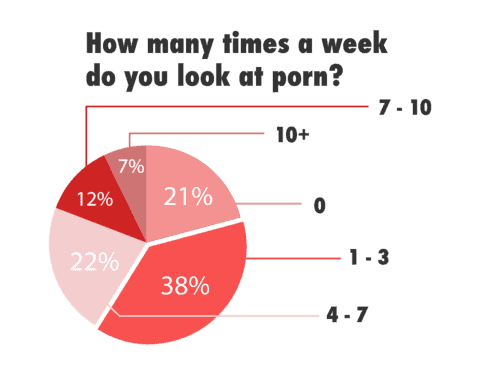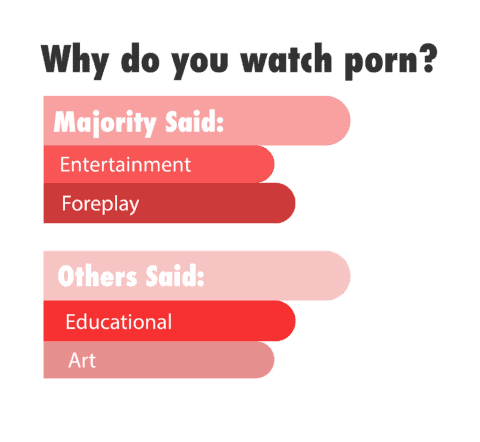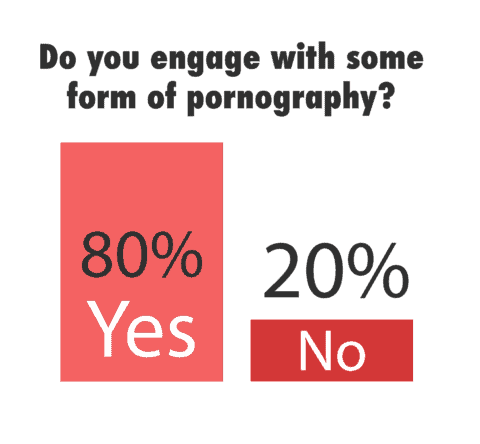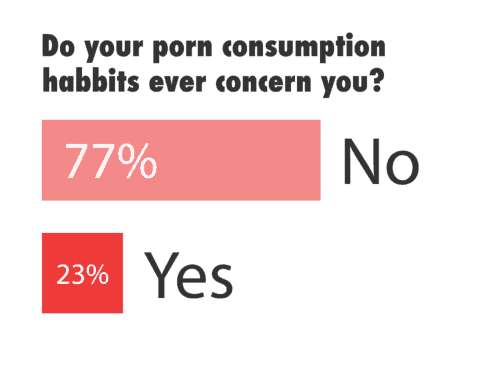While most don’t care to openly discuss it, pornography plays an active and impactful role in the lives of many University of Saskatchewan students. I decided to get in touch with some of those on campus and collect their insights on how they interact with porn.
As a result of this personal subject matter, names have been changed to protect the privacy of interviewees. The subjects will be identified, in order of appearance, as Alice, Margaret, Dean, Velma, Jordan and Ryan.
Although it’s likely not the kind of conversation you’d want to have around the dinner table, with the comfort of anonymity, all of my participants were candid and  happy to open up about the role that porn plays in their lives.
happy to open up about the role that porn plays in their lives.
For most, first encounters with porn were the result of accidents as a child. The leftout magazines and unclosed web browsers of parents or siblings were common culprits. When it came to the topic of searching out porn intentionally, however, answers greatly diverged. In Alice’s case, her entrance to porn was a softer one.
“I don’t know if I would necessarily call myself a furry, but I started out looking at drawings of animals, and a lot of them were pretty PG,” Alice said. “It was an easy way in. There’s a lot of stuff out there — like anthropomorphic animals, not regular animals.”
To this day, Alice finds animated depictions of sex and sexuality easier to deal with than human pornography.
“I like drawn porn, so I usually look at furries or anime porn, because it’s clean,” Alice said. “Human bodies are kind of gross. It also draws into imagination, in a way, as well. You can draw things that can’t happen in real life and sometimes those things are a big turn on.”
On the other hand, Margaret had little hesitancy when first seeking out porn online.
“I think I started in grade five, maybe a little bit earlier,” Margaret said. “I think it was just sex scenes in movies.”
A decade later, Margaret’s interest in porn continues. She shared that porn is a topic of open and productive discussion in her current relationship.
“It’s definitely something we’re both very open with to each other and we’ve watched porn together in more of a scientific lens,” Margaret said. “It’s never turned  out to be enjoyable — but it’s definitely something we’re open to each other about and I find that’s healthy and good in relationships.”
out to be enjoyable — but it’s definitely something we’re open to each other about and I find that’s healthy and good in relationships.”
For most others, porn remains something that they interact with in private or outside of their sexual relationships with others. Alice offered her feelings on sharing porn with partners.
“I haven’t really hit that point yet,” Alice said. “I feel like it could be, but it’s still not at the point where I’m comfortable enough sharing that kind of an interaction with a person, even though it comes in through conversation and in sexual play — but not looking at the stuff, just talking about it in a foreplay kind of way.”
When asked if porn has played a role in previous relationships, Dean seemed to think its impact was minimal at best.
“Maybe I could count on one hand how many times we watched porn together in past relationships,” Dean said. “My current one we have not at all, so it hasn’t really played a role.”
Despite this, Dean asserts that his porn consumption is nothing he’s ever kept secret from partners.
“I’m pretty open about what I watch for porn and I don’t hide that I watch it or stuff like that, so I don’t think it’s anything I’m concerned about hiding,” Dean said.
While all were able to point out the many problematic aspects of porn, interviewees across many spectrums still admitted to deriving a lot of positive experience out of engaging with it.
For Velma, exposure and interaction with porn allowed her to re-examine her own sexuality. Her experience seems to epitomize one’s ability to still benefit from something imperfect.
“Porn was actually one of the first ways I figured out that I was actually [bisexual],” Velma said. “There’s gay female porn out there. It’s complicated because it’s  very much targeted at a male audience, because it’s produced by men. It’s a safe way of exploring your sexuality at first.”
very much targeted at a male audience, because it’s produced by men. It’s a safe way of exploring your sexuality at first.”
The ability to learn and gain experience from porn is something that Dean can also relate to. For him, porn allows for people to windowshop what they might like to try.
“You can go if you wanted to and search ‘choking’ or if you want to see a three-way or something and see what it’s like,” Dean said. “I guess it’s a good way to explore what you might like without having the potential humiliation or embarrassment of doing it and not being into it.”
Another surprising commonality I found amongst my subjects was that porn consumption often had little relation to sexual lust or desire. Alice noted that for her, porn could be regarded as a tool to facilitate masturbation for any number of end goals.
“Often, when I look at porn, it’s specifically because I’m hoping to masturbate and have some kind of stress relief,” Alice said. “Sometimes it’s a pain relief because orgasming can relieve menstrual cramps — sometimes if I want to sleep better.”
While the discussion has been mostly positive up until this point and all interviewees admitted to interacting with porn in their personal lives, they all also had pressing concerns about the effects and messages of porn.
For Jordan, mainstream porn is the source of many harmful stereotypes regarding the queer community.
“As someone who once identified as a gay woman — I identify as queer and genderfluid now — I’ve directly experienced the results of the sexualization of lesbians in our society and I do think this is partly to do with the popularity of lesbian porn, where ‘gay’ women are portrayed as sexual objects for male pleasure,” Jordan said. “I’ve had strangers stop me and my girlfriend on the street to ask if they could watch us having sex. I’ve had men offer us money to kiss. I’ve had them ask if we’d have a threesome with them, et cetera.”
Margaret, who maintains that porn itself is not the problem, seems to agree that the wrong kinds can lead to toxic results.
“I want to see more queer-friendly porn,” Margaret said. “I want to see porn that depicts — in a positive way, in a healthy way — people of the same sex, people who are intersex.”
The most concerned criticism of all came from Ryan, whose disapproval of porn — as well as his best efforts to abstain from it — is largely influenced by his faith.
“I think it would be helpful if I clarify early on that I am a Christian,” Ryan said. “It’s mostly in the latter years of my life, so from grade 11, grade 12 to where I am now, that I’ve really embraced that, and I’ve decided that it’s not only a significant part of my life but the centre to my life.”
Ryan has recently become familiar with Fight the New Drug, an anti-porn non-profit organization that aims to scientifically explain porn’s harmful effects and  spread the slogan “Porn Kills Love.”
spread the slogan “Porn Kills Love.”
After seeing some of FTND’s literature shared on Facebook, Ryan became interested in the movement.
“I started flipping through these things and I found them impactful,” Ryan said. “Their views align with mine to the extent that they view porn as negative and something to be avoided. It treats it like addiction and I find that very compelling, because in my own experiences — and experiences with others who have been open with me about talking about this stuff — yeah, that’s basically what it is.”
While the Diagnostic and Statistical Manual of Mental Disorders does not recognize porn addiction as an affliction, Ryan agreed with FTND’s claims that porn has addictive properties and habitual consumption leads to decreased empathy, body objectification and a long-term increase in the severity of what is watched.
“I can speak from experience,” Ryan said. “This is one of the reasons I really felt compelled to address this in my life is because I agree with all those things. I felt those things before I found Fight the New Drug and they just affirmed what I suspect about myself is true. That’s why I’m trying so hard to change.”
I had to point out that — despite claims of no religious affiliation — the organization is a product of the Church of Latter Day Saints and the research they cite comes primarily from the Mormon-owned Brigham Young University.
“If they have religious affiliations, then I think it’s okay to greet it with some skepticism and bias,” Ryan said. “I think about the ideas they put forward to me, and what they’re really reporting — regardless of faith — is healthy relationships and their goals seem to be combatting things like divorce rates or the mentalities that result in sexual assaults. That, I can get behind.”
Overall, the U of S opinion seems to be that porn in-and-of itself is not strictly a problem. While all students expressed concerns and criticisms of at least certain forms of porn or the effects it can have, all admitted to having prior experiences with porn and many also had complimentary things to say as well.
Hopefully, this will have served as an eye-opening and educational experience — I know I certainly learned a lot.
—
Zach Tennent / Opinions Editor
Infographics: Lesia Karalash / Graphics Editor.
Statistics for all infographics are the result of a poll conducted on pornography through thesheaf.com, in February 2017. All results are anonymous.
Leave a Reply